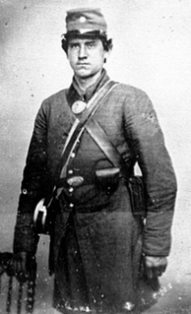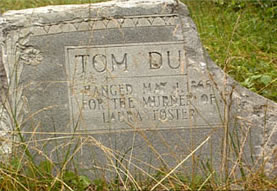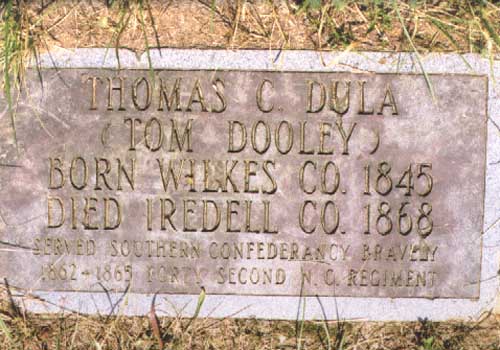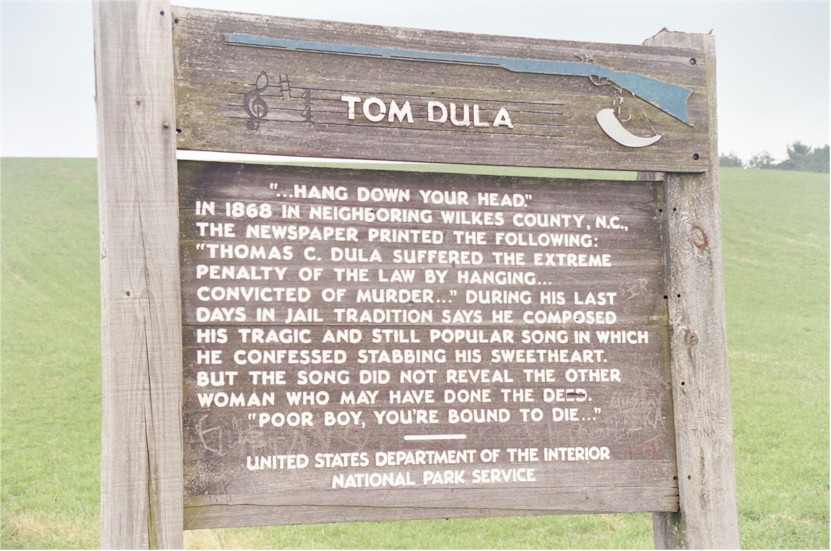Tom Dooley
|
Tom Dooley is a North Carolina folk song, based on a murdercase dating from 1866, the year Laura Foster was murdered in.
Impoverished Confederate veteran Tom Dula (Dooley), Foster's lover and probable fiancé was convicted of her murder and hanged May 1, 1868. Foster was stabbed to death with a large knife. The brutality of the attack accounted for the widespread publicity the murder and subsequent trial received. Before he left for the war, Tom Dula had a lover, Anne Melton, who was married to somebody else. Anne Melton was also a cousin of Laura Foster. Her comments led to the discovery of Foster's body, but Melton was acquitted in a seperate trial based on Dula's word. Dula's enigmatic statement that he had not killed the girl, but still deserved to be punished, led to press speculation that Melton had committed the murder and that Dula covered for her. Melton, who had once expressed her jealousy of Dula's plans to marry Laura Foster, died insane a few years after the homicide. |
Thanks to the efforts of newspapers and to the fact that former North Carolina governor Zebulon Vance represented Dula pro bono, Dula's hanging and trial were given widespread national publicity. A local poet, Thomas C. Land, wrote a song about the hanging. Tradition says Dula composed the song himself during his last days in jail.
Col. James Greyson, mentioned in the song, was a Tennessee politician. He had hired Dula on his farm, when the young man fled North Carolina under suspicion and was using a false name. Greyson helped the North Carolinians to capture Dula and he also was involved in bringing Dula back to North Carolina. Greyson sometimes is seen as a rival of Dula's or a vengeful sheriff, but he had nothing else to do with the case.
Col. James Greyson, mentioned in the song, was a Tennessee politician. He had hired Dula on his farm, when the young man fled North Carolina under suspicion and was using a false name. Greyson helped the North Carolinians to capture Dula and he also was involved in bringing Dula back to North Carolina. Greyson sometimes is seen as a rival of Dula's or a vengeful sheriff, but he had nothing else to do with the case.
|
Dula's trial took place in Statesville, because it was believed he would not get a fair trial in Wilkes County. Reason for this thinking was that Dula had been quite a free thinking man in his behaviour with women: Melton was a married woman and it was also testified in court that Dula had said he was going to do in whoever gave him "the pock", syphilis. It was said that Dula believed that Laura had passed it to him, whereafter he passed it on to Ann.
After he had been sentenced to death, he got a new trial on appeal, but again he was believed to be guilty. Dula was convicted and hanged on May 1, 1868. His alleged accomplice, Jack Keaton, was set free. On the gallows Dula reportedly stated: "Gentlemen, do you see this hand? I didn't harm a hear on the girl's head". The ballad "Tom Dooley" was sung shortly after Dula's execution. It was the recording by the Kingston Trio that made it popular across the borders of North Carolina. Sources: http://www.appalachianhistory.net/2012/05/hang-down-your-head-tom-dula.html; http://en.wikipedia.org/wiki/Tom_Dooley_(song); http://en.wikipedia.org/wiki/Tom_Dula |
|
|
Lyrics sung by The Kingston Trio
Hang down your head, Tom Dooley Hang down your head and cry Hang down your head, Tom Dooley Poor boy, you're bound to die I met her on the mountain There I took her life Met her on the mountain Stabbed her with my knife Hang down your head, Tom Dooley Hang down your head and cry Hang down your head, Tom Dooley Poor boy, you're bound to die This time tomorrow Reckon where I'll be Hadn't a-been for Grayson I'd a-been in Tennessee Hang down your head, Tom Dooley Hang down your head and cry Hang down your head, Tom Dooley Poor boy, you're bound to die Hang down your head, Tom Dooley Hang down your head and cry Hang down your head, Tom Dooley Poor boy, you're bound to die This time tomorrow Reckon where I'll be Down in some lonesome valley Hangin' from a white oak tree Hang down your head, Tom Dooley Hang down your head and cry Hang down your head, Tom Dooley Poor boy, you're bound to die Hang down your head, Tom Dooley Hang down your head and cry Hang down your head, Tom Dooley Poor boy, you're bound to die Poor boy, you're bound to die Poor boy you're bound to die Poor boy, you're bound to die... |




